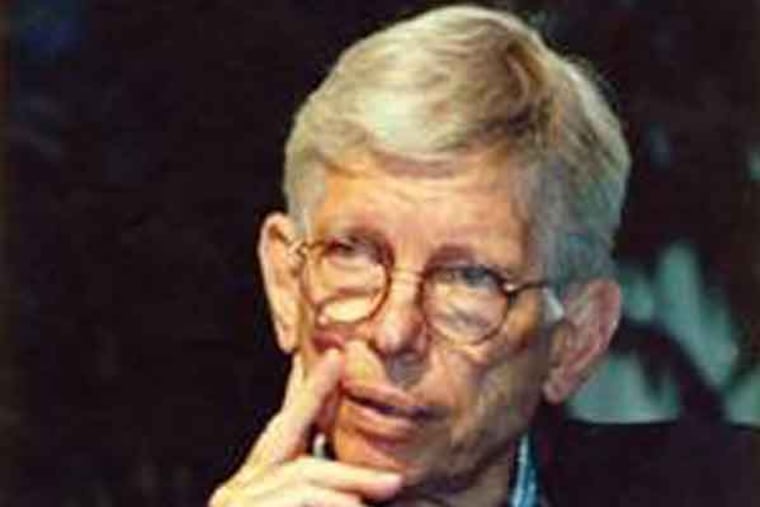Acclaimed Fox Chase geneticist dies at 93
Alfred G. Knudson Jr., 93, a longtime Fox Chase Cancer Center scientist and international expert on the genetics of cancer, died Sunday, July 10, at his home in Center City Philadelphia after an extended illness.

Alfred G. Knudson Jr., 93, a longtime Fox Chase Cancer Center scientist and international expert on the genetics of cancer, died Sunday, July 10, at his home in Center City Philadelphia after an extended illness.
He was best known for his groundbreaking "two-hit theory" on how cancer develops, which found it takes two "hits" or mutations to a gene for cancer to occur. The first hit may be hereditary; the other perhaps chemical exposure, radiation, or some other cause.
He was one month shy of his 94th birthday.
"He won everything but the Nobel Prize, and he might have won that, too, if he had lived a little longer," said Jonathan Chernoff, scientific director at Fox Chase and an oncologist.
As recently as Thursday evening, Dr. Knudson had asked a longtime colleague how many papers they had coauthored.
"I said, 'We wrote seven papers together and there is one more coming,' " said Alfonso Bellacosa, a Fox Chase specialist in cancer genetics and cancer biology.
Dr. Knudson, who came to Fox Chase in 1976 and never officially retired, according to colleagues, developed his internationally acclaimed two-hit theory while working at the University of Texas Health Science Center at Houston in 1971. The theory was based on work studying children with retinoblastoma, a rare cancer of the eye that can be inherited or come on spontaneously. Using mathematical models, he predicted that people who have inherited one mutated gene need something to go wrong in a second copy of the gene for a tumor to develop.
His theory served as the foundation for much of current cancer research and helped explain the relationship between hereditary and nonhereditary cancers.
"This was all conceptual work," Chernoff said.
The technology didn't exist to confirm Dr. Knudson's theory until 16 years later, Chernoff explained.
"He was such a mentor to all of us. He trained us in how to think about cancer," he said.
Dr. Knudson won top awards, including the Kyoto Prize and the Albert Lasker Medical Research Award, often called America's Nobel Prize. Many of them are on display at Fox Chase.
"He was a pediatrician at heart," said his wife, Anna Meadows, an international leader in the study of childhood cancer who had a 38-year career at the Children's Hospital of Philadelphia. "We had a common interest in pediatric oncology, in genetics, and lots of things."
In a memoir about her husband of nearly 40 years, Meadows, 85, described his "boundless" intellectual curiosity.
"One can never tell what the next subject or question will be," she wrote, "but however simple or complex it is, he rarely gives up before he has an answer."
Born in Los Angeles, Dr. Knudson received a bachelor's degree from the California Institute of Technology; a medical degree from Columbia University; and a doctorate from the California Institute of Technology. He served in both the Navy and Army, Meadows said.
Meadows said her husband loved to mentor young researchers. Bellacosa met Dr. Knudson in 1984 when he was a medical school student in Rome.
"It was a life-changing experience to listen to him," Bellacosa said. On Thursday, he said goodbye to his mentor. Dr. Knudson, he said, wanted him to wish his colleagues at Fox Chase well - and he wanted to know about that final research paper they were coauthoring.
"He knew that his life was coming to an end soon, but he was thinking about his work in a caring way," Bellacosa said.
In addition to his wife, Dr. Knudson is survived by daughters Linda Gaul, Nancy, and Dorene; stepchildren Brian Meadows, Adam Meadows, and Elizabeth Meadows of Philadelphia; 10 grandchildren and stepgrandchildren; and two great-grandchildren.
The family plans to hold a celebration of his life in September.
215-854-4693@ssnyderinq